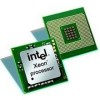Intel X5472 Specification Update - Page 23
EFLAGS, CR0, CR4 and the EXF4 Signal May be Incorrect after
 |
UPC - 735858201551
View all Intel X5472 manuals
Add to My Manuals
Save this manual to your list of manuals |
Page 23 highlights
Implication: Operating systems may observe a #GP fault being serviced before higher priority Interrupts and Exceptions. Intel has not observed this erratum on any commercially available software. Workaround: None identified. Status: For the steppings affected, see the Summary Tables of Changes. AX19. Store Ordering May be Incorrect between WC and WP Memory Type Problem: According to Intel® 64 and IA-32 Intel Architecture Software Developer's Manual, Volume 3A "Methods of Caching Available", WP (Write Protected) stores should drain the WC (Write Combining) buffers in the same way as UC (Uncacheable) memory type stores do. Due to this erratum, WP stores may not drain the WC buffers. Implication: Memory ordering may be violated between WC and WP stores. Workaround: None identified. Status: For the steppings affected, see the Summary Tables of Changes. AX20. EFLAGS, CR0, CR4 and the EXF4 Signal May be Incorrect after Shutdown Problem: When the processor is going into shutdown due to an RSM inconsistency failure, EFLAGS, CR0 and CR4 may be incorrect. In addition the EXF4 signal may still be asserted. This may be observed if the processor is taken out of shutdown by NMI#. Implication: A processor that has been taken out of shutdown may have an incorrect EFLAGS, CR0 and CR4. In addition the EXF4 signal may still be asserted. Workaround: None identified. Status: For the steppings affected, see the Summary Tables of Changes. AX21. Premature Execution of a Load Operation Prior to Exception Handler Invocation Problem: If any of the below circumstances occur, it is possible that the load portion of the instruction will have executed before the exception handler is entered. 1. If an instruction that performs a memory load causes a code segment limit violation. 2. If a waiting X87 floating-point (FP) instruction or MMX™ technology (MMX) instruction that performs a memory load has a floating-point exception pending. 3. If an MMX or SSE/SSE2/SSE3/SSSE3 extensions (SSE) instruction that performs a memory load and has either CR0.EM=1 (Emulation bit set), or a floating-point Topof-Stack (FP TOS) not equal to 0, or a DNA exception pending. Implication: In normal code execution where the target of the load operation is to write back memory there is no impact from the load being prematurely executed, or from the restart and subsequent re-execution of that instruction by the exception handler. If the target of the load is to uncached memory that has a system side-effect, restarting the instruction may cause unexpected system behavior due to the repetition of the sideeffect. Particularly, while CR0.TS [bit 3] is set, a MOVD/MOVQ with MMX/XMM register operands may issue a memory load before getting the DNA exception. Workaround: Code which performs loads from memory that has side-effects can effectively workaround this behavior by using simple integer-based load instructions when accessing side-effect memory and by ensuring that all code is written such that a code segment limit violation cannot occur as a part of reading from side-effect memory. Status: For the steppings affected, see the Summary Tables of Changes. 23 Intel® Xeon® Processor 5400 Series Specification Update















